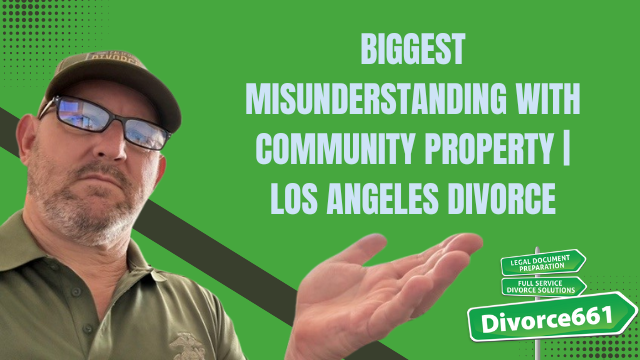😦 BIGGEST Misunderstanding With Community Property 😱 Los Angeles Divorce
When it comes to marriage and finances, especially for couples marrying later in life or those in blended families, there’s a common misconception about how community property laws really work. Many believe that keeping their assets separate—whether it’s individual bank accounts or pre-existing property—means those assets remain theirs alone in the event of a divorce. But the reality under California law can be quite different.
Understanding this crucial distinction is essential, especially in places like Los Angeles, where community property rules govern how assets are divided during a divorce. Let’s dive into the biggest misunderstanding about community property and clarify what you need to know to protect your financial interests.
Marriage, Assets, and the Illusion of Separate Finances
Today, more people are entering marriage later in life, often bringing significant assets into the relationship. Additionally, blended families are increasingly common, which complicates financial arrangements even further. To manage their finances, many couples choose to keep things separate—each partner maintaining their own bank accounts and assets with the understanding that what’s theirs stays theirs.
This approach can feel straightforward and fair, and it absolutely can work as a matter of personal preference. Setting up agreements or trusts to keep assets distinct during marriage is a valid strategy. However, it’s important to realize that simply having separate accounts or assets titled in one person’s name does not automatically mean those assets are protected from community property laws in a divorce.
Community Property: What Does It Really Mean?
California is a community property state, which means that most assets and debts acquired during the marriage are considered jointly owned by both spouses, regardless of whose name they are in. This includes income, property purchases, and even debts incurred during the marriage.
Here’s the critical point often misunderstood: just because you have your own bank account or kept certain assets in your name before or during the marriage, it doesn’t necessarily mean those assets are exempt from being divided in a divorce. The law looks beyond the surface ownership and considers the nature and timing of the asset acquisition.
“Just because I had my own accounts and he had his own accounts, that doesn’t mean that what’s yours is yours and what’s his is his.”
This means assets can be classified as community property even if only one spouse’s name is on the account or title. The law aims to fairly divide what was built or earned together during the marriage, recognizing that both spouses contributed, whether financially or otherwise.
Keeping Assets Separate: Agreements and Planning
For couples who want to maintain separate ownership of their assets, there are legal tools available, such as prenuptial or postnuptial agreements. These agreements can outline how assets should be treated in the event of a divorce, providing clarity and protection for both parties.
However, these agreements must be carefully drafted and executed with full disclosure and mutual consent to be enforceable. Simply deciding to keep accounts separate without a formal agreement may not suffice under community property laws.
What You Should Do
1. Understand your state’s laws: California’s community property laws are unique and can be complex. Educate yourself on how assets are treated during marriage and divorce.
2. Consult a family law professional: If you’re entering a marriage with significant assets or are part of a blended family, seek legal advice to explore options like prenuptial agreements.
3. Keep clear records: Document the source and timing of your assets, especially if you want to prove that certain property is separate and not subject to division.
4. Communicate openly with your spouse: Discuss financial goals and plans to avoid surprises and misunderstandings in the future.
Conclusion
Community property laws can be a source of confusion, particularly for couples who start their marriage with separate assets or blended family dynamics. The biggest misunderstanding is assuming that separate accounts or assets automatically remain separate in divorce. In reality, the law often treats assets acquired during the marriage as jointly owned, regardless of whose name is on the title.
By understanding these rules and planning accordingly, you can protect your financial interests and ensure a fair outcome, should the marriage end. If you’re navigating a divorce or planning your financial future, it’s wise to get informed and seek guidance tailored to your situation.
For more insights on divorce and community property, visit Divorce661.com and consider scheduling a free consultation to discuss your unique circumstances.

